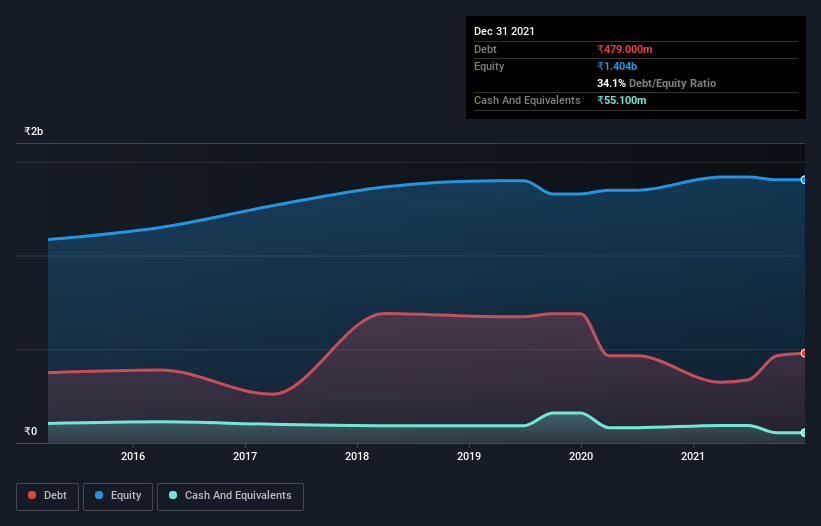Some say volatility, rather than debt, is the best way to think about risk as an investor, but Warren Buffett famously said that 'Volatility is far from synonymous with risk.' So it might be obvious that you need to consider debt, when you think about how risky any given stock is, because too much debt can sink a company. We note that Aspinwall and Company Limited (NSE:ASPINWALL) does have debt on its balance sheet. But is this debt a concern to shareholders?
When Is Debt Dangerous?
Debt is a tool to help businesses grow, but if a business is incapable of paying off its lenders, then it exists at their mercy. In the worst case scenario, a company can go bankrupt if it cannot pay its creditors. While that is not too common, we often do see indebted companies permanently diluting shareholders because lenders force them to raise capital at a distressed price. Of course, the upside of debt is that it often represents cheap capital, especially when it replaces dilution in a company with the ability to reinvest at high rates of return. When we examine debt levels, we first consider both cash and debt levels, together.
View our latest analysis for Aspinwall
What Is Aspinwall's Debt?
You can click the graphic below for the historical numbers, but it shows that as of September 2021 Aspinwall had ₹479.0m of debt, an increase on ₹323.7m, over one year. However, because it has a cash reserve of ₹55.1m, its net debt is less, at about ₹423.9m.

A Look At Aspinwall's Liabilities
We can see from the most recent balance sheet that Aspinwall had liabilities of ₹932.4m falling due within a year, and liabilities of ₹79.6m due beyond that. On the other hand, it had cash of ₹55.1m and ₹289.6m worth of receivables due within a year. So it has liabilities totalling ₹667.3m more than its cash and near-term receivables, combined.
This deficit isn't so bad because Aspinwall is worth ₹1.29b, and thus could probably raise enough capital to shore up its balance sheet, if the need arose. But it's clear that we should definitely closely examine whether it can manage its debt without dilution.
We use two main ratios to inform us about debt levels relative to earnings. The first is net debt divided by earnings before interest, tax, depreciation, and amortization (EBITDA), while the second is how many times its earnings before interest and tax (EBIT) covers its interest expense (or its interest cover, for short). Thus we consider debt relative to earnings both with and without depreciation and amortization expenses.
Aspinwall has a debt to EBITDA ratio of 2.6 and its EBIT covered its interest expense 5.6 times. Taken together this implies that, while we wouldn't want to see debt levels rise, we think it can handle its current leverage. Pleasingly, Aspinwall is growing its EBIT faster than former Australian PM Bob Hawke downs a yard glass, boasting a 181% gain in the last twelve months. There's no doubt that we learn most about debt from the balance sheet. But you can't view debt in total isolation; since Aspinwall will need earnings to service that debt. So when considering debt, it's definitely worth looking at the earnings trend. Click here for an interactive snapshot.
Finally, a business needs free cash flow to pay off debt; accounting profits just don't cut it. So it's worth checking how much of that EBIT is backed by free cash flow. Over the last three years, Aspinwall actually produced more free cash flow than EBIT. That sort of strong cash generation warms our hearts like a puppy in a bumblebee suit.
Our View
The good news is that Aspinwall's demonstrated ability to convert EBIT to free cash flow delights us like a fluffy puppy does a toddler. But truth be told we feel its level of total liabilities does undermine this impression a bit. When we consider the range of factors above, it looks like Aspinwall is pretty sensible with its use of debt. While that brings some risk, it can also enhance returns for shareholders. There's no doubt that we learn most about debt from the balance sheet. But ultimately, every company can contain risks that exist outside of the balance sheet. These risks can be hard to spot. Every company has them, and we've spotted 5 warning signs for Aspinwall (of which 1 is a bit unpleasant!) you should know about.
If, after all that, you're more interested in a fast growing company with a rock-solid balance sheet, then check out our list of net cash growth stocks without delay.
New: Manage All Your Stock Portfolios in One Place
We've created the ultimate portfolio companion for stock investors, and it's free.
• Connect an unlimited number of Portfolios and see your total in one currency
• Be alerted to new Warning Signs or Risks via email or mobile
• Track the Fair Value of your stocks
Have feedback on this article? Concerned about the content? Get in touch with us directly. Alternatively, email editorial-team (at) simplywallst.com.
This article by Simply Wall St is general in nature. We provide commentary based on historical data and analyst forecasts only using an unbiased methodology and our articles are not intended to be financial advice. It does not constitute a recommendation to buy or sell any stock, and does not take account of your objectives, or your financial situation. We aim to bring you long-term focused analysis driven by fundamental data. Note that our analysis may not factor in the latest price-sensitive company announcements or qualitative material. Simply Wall St has no position in any stocks mentioned.
About NSEI:ASPINWALL
Aspinwall
Engages in coffee processing and trading, rubber plantations, natural fiber, and logistics businesses in India, the Americas, Europe, and internationally.
Slight risk with mediocre balance sheet.
Market Insights
Community Narratives




